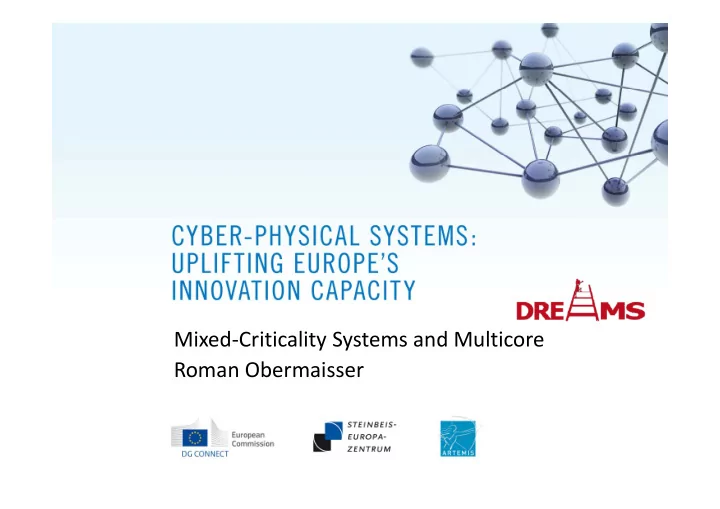

Mixed ‐ Criticality Systems and Multicore Roman Obermaisser
Agenda 09:00 ‐ 09:30 Welcome and Introductions ‐ Prof Dr Roman Obermaisser, University of Siegen Short keynote address ‐ Prof Dr Heinrich Daembkes, ARTEMIS ‐ IA President The Commissions view on the Mixed Criticality Systems and Multicore ‐ Z Olivan Tomas, European Commission 09:30 ‐ 09:40 Strategy and vision in context of CPS and "smart everywhere": Background and context of the CPS event & main results from Day 1 Dr Roman Obermaisser, University of Siegen 09:40 ‐ 10:30 Session 1: Mixed ‐ Criticality Systems and Certification Call 10 Projects ‐ 2013 ‐ Dr Roman Obermaisser, University of Siegen (DREAMS) ‐ Francisco Cazorla, Barcelona Supercomputing Centre (PROXIMA) Call 7 Projects – 2011 ‐ Certification for MCS ‐ Dr Madeleine Faugère, Thales (CERTAINTY, Certification for MCS) National projects ‐ Prof Dr Juergen Becker, KIT Kalsruhe Institute of Technology (ARAMIS)
Agenda (2) 10:30 ‐ 12:00 Session 2: Embedded Multi ‐ Core Platforms Call 4 Projects ‐ 2009 ‐ William Fornaciari, Politecnico de Milano (2PARMA) ARTEMIS JU ‐ Philippe Bonnot, Thales (ACROSS, ARTEMIS project) Call 7 Projects ‐ 2011 ‐ Marcello Coppola, ST Microelectronics (VIRTICAL) ‐ Fabrice Lemonnier, Thales (FLEXTILES) ‐ Salvador Trujillo, Ikerlan (MULTIPARTES) ‐ Torben Hoffmann, Erlang (PARAPHRASE) ‐ Antonio Solinas, Akhela (TOUCHMORE) Call 10 Projects – 2013 ‐ Luis Miguel Pinho, Politecnico do Porto (P ‐ SOCRATES) Other success stories from 2009 ‐ Jan Beeran, Honeywell (PARMERASA) ‐ Gerard Rawerda, Recore systems (DESYRE) ‐ Florian Broekaert, Thales (PHARAON) 12:00 ‐ 13:00 Lunch
Agenda (3) 13:00 ‐ 14:45 Session 3: Exploitation, Innovation and Commercial Impact ‐ Towards Platform building and industrial exploitation Mixed ‐ Criticality Community and Innovation Roadmap Exploitation, Innovation and Impact in Multicore systems Panel Discussion on Innovation ‐ Commercial Impact Arjan Geven, TTTech Marcello Coppola, ST Microelectronics Salvador Trujillo, Ikerlan Philippe Bonnot, Thales Antonio Solinas, Akhela 14:45 ‐ 15:00 Conclusions of Day 2/Future of the area: MCS & Multicore "3 key messages" to be presented in the Joint Closing panel Dr Roman Obermaisser, University of Siegen 15:00 ‐ 15:30 Close of breakout sessions and coffee 15:30 ‐ 16:30 Joint closing panel Report from sessions: ‘3 key messages’ Wrap ‐ up
Three Key Messages of MCS Workshop 1. TECHNOLOGY: Key technological challenges must be addressed towards cost ‐ effective development of MCS 2. INNOVATION: Emphasis on innovation for MCS and Multicore as one of the key changes from FP7 to H2020 3. COMMUNITY BUILDING: Concertation by a MCS community is required to build critical mass, foster collaboration and knowledge exchange, influence standards and facilitate technological advances with bigger cross ‐ domain outputs
Technology Challenges • Timing analysis methodologies and platform support for timing predictability (e.g., PROXIMA, PARMERASA) • Virtualization techniques for resources with isolation mechanisms and flexibility in application mappings (e.g., FLEXTILES, vIRTICAL, ACROSS) • Adaptivity in MCS combing design ‐ time and run ‐ time methods and addressing significant EFP (e.g., FLEXTILES)
Technology Challenges (2) • Methodology and model ‐ driven development methods for MCS including customizable toolchains and automation, DSE application design and mapping, formal validation and analysis (e.g., MULTIPARTES, TOUCHMORE, DREAMS) • Heterogeneous application subsystems with dissimilar models of computation, platform requirements and timing models (e.g., FLEXTILES, DREAMS) • Incremental and modular certification techniques for MCS and multi ‐ core systems
Innovation Goals • Integration of development methods and MDE for MCS into commercial development and verification tools (e.g., PROXIMA, CONTREX, DREAMS) • Design methodologies and associated toolsets for COTS components and general purpose commercial architectures (e.g., DREAMS, PROXIMA) • Hardware ‐ assisted virtualization in mixed ‐ criticality products such as home gateways or secure smartphones (e.g., vIRTICAL, DREAMS)
Innovation Goals (2) • Use of high performance processors in critical systems with real ‐ time requirements (e.g., DREAMS, P ‐ SOCRATES) • Integration of runtime resource management into products and reference designs for energy improvement, power saving, QoS and real ‐ time support (e.g., 2PARMA) • Advances in certification of MCS and corresponding standards including modular safety cases, use of multi ‐ core platforms and mixed ‐ criticality product lines (e.g., ACROSS, CERTAINTY, DREAMS)
Goals of MCS Community Building Bundling efforts on mastering technology challenges and achieving innovation • goals European influence on standards and joint standardization activities • Constituency building for a stronger and well identified constituency so we can • position ourselves clearly in H2020 Connection to open source communities • Faciliate information flow and interfaces between projects and organization • Innovation roadmap to give a perspective of what is needed in Europe in the • next decade from all R&D and innovation actors in the area of MCS Exploit synergies between HPC and ES worlds • Cross ‐ domain exploitation with synergies between application domains, benefits • from larger markets and exploitation of economies of scale
Conclusion • Increasing importance of mixed ‐ criticality systems based on multi ‐ core processors • Focus on innovations in the area of MCS with transfer to business units and products • Technological challenges in methodologies and platforms towards the cost ‐ effective development of MCS • Eco system building using a MCS community is required to create critical mass across industry to prevent fragmentation, to support research and innovation development of SMEs and allow a cross ‐ sectoral, multi ‐ platform approach.
Recommend
More recommend